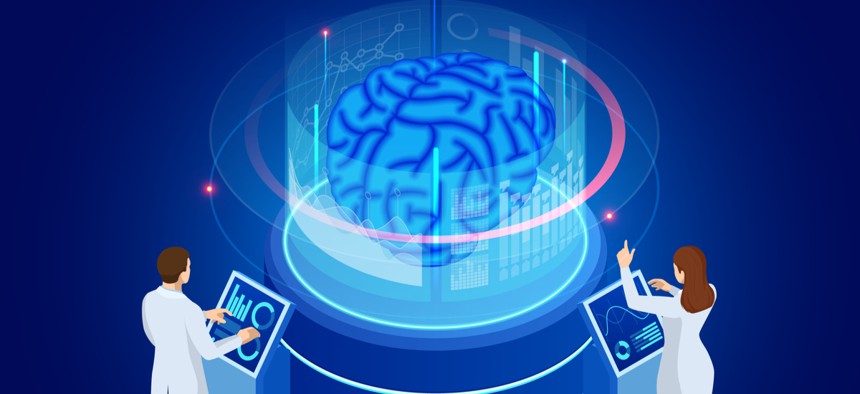What Veterans Affairs Aims to Accomplish Through Its Artificial Intelligence Institute

Golden Sikorka/Shutterstock.com
The agency plans to streamline and advance its AI efforts to better meet veterans’ needs.
The Veterans Affairs Department recently launched a National Artificial Intelligence Institute to coordinate and advance strategic vet-focused research and development efforts to harness the budding technology.
“VA has a unique opportunity to be a leader in artificial intelligence,” Secretary Robert Wilkie said in a statement. “VA’s artificial intelligence institute will usher in new capabilities and opportunities that will improve health outcomes for our nation’s heroes.”
Home to America’s largest integrated health care system, the VA trains more doctors and nurses than any other entity in the nation and also houses the largest genomic knowledge base linked to health care information in the world. Throughout 2019, the agency unveiled a variety of deliberate investments and projects to leverage artificial intelligence to better meet veterans’ needs. For example, the agency and tech giant IBM launched an AI-powered mental fitness app to help veterans transitioning to civilian life earlier this year, and VA collaborated with DeepMind Health to develop an AI system that can forecast a life-threatening kidney disease before it appears.
The agency also appointed Dr. Gil Alterovitz as its first-ever national artificial intelligence director this summer. A Harvard Medical professor who has led national and international collaborative initiatives that used data and technology to innovate across the health care landscape, Alterovitz will serve as the NAII’s director and oversee all of its efforts. He told Nextgov Monday that the new institute has been several months in the making and will garner some federal funding for its efforts. Alterovitz also confirmed that the institute will be housed directly at the VA.
“There is a special opportunity to work for veteran needs via AI by focusing on improving health and well-being [through research and development],” he said. “We hope to focus on veteran priorities in such work.”
NAII will engage veterans and stakeholders across the health care sector to solicit and execute flagship AI research projects that emphasize topics like deep learning, explainable AI, and privacy-preserving AI. They’ll aim to “demonstrate [the] size, scope, and magnitude of capabilities that deliver positive real-world outcomes for Veterans.” According to agency insiders, “one of the first tasks the NAII took on was surveying the existing use of AI by VA researchers” and going forward, the institute will also boost AI-related research projects already underway by offering up fresh resources and forging new possibilities for collaboration.
“Medical centers are across the country and new insights can be best done working together,” Alterovitz said.
The AI director also has extensive experience leading projects known as tech sprints, which essentially enable outside organizations to test out data in the VA format to develop tools and programs that can lead to new data-driven insights—without waiting long periods to establish partnership agreements. NAII insiders will lead AI tech sprints to accelerate innovation in the ecosystem and also aim to create an “AI Tech Sprint handbook” to help new teams orchestrate sprints to introduce health care solutions.
"We envision a future where AI can give us tools to serve Veterans in the best way possible, as they did for our nation," Alterovitz said.
NEXT STORY: Emerging Technology Trends






